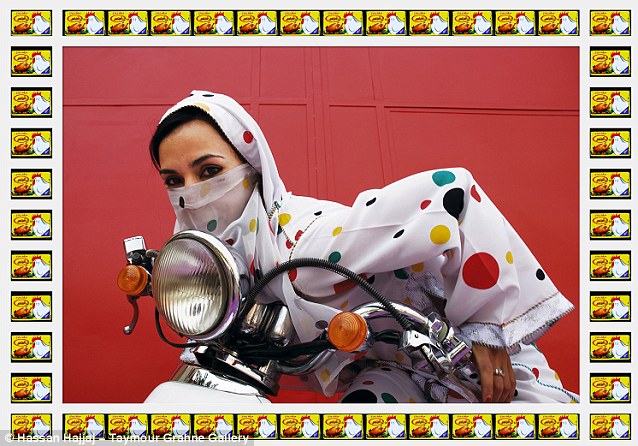Many displaying an impressive attitude and wearing bright sunglasses, the women are framed by the rich and vibrant colours of their African heritage. Photographed as part of an exhibition named 'Kesh Angels these striking images capture the vibrant street culture of Morocco and pay tribute to the biker culture of the young women of Marrakesh.Though not part of the problem gangs that do exist in the city and perpetuate crime, these women still possess a fierce attitude and a formidable presence.Usually found painting henna on tourists in Marrakesh’s main square, the women represent the blending of traditional cultures and modern feminism, with many speaking numerous languages and working full time alongside being a mother.Created by Moroccan- born, UK-based artist Hassan Hajjaj the exhibition is currently on display in the Taymour Grahne Gallery in New York.Speaking to Vice magazine, Hassan says that though the concept of a biker gang is imagined, the cities passion for motorcycles is very much a reality, and his inspiration for the series.‘Marrakech is really a bike city; everyone rides them. Women, kids, old men, families, everybody. It's transportation; it's really used for work. A few of the bikes in the photos are from friends of mine we borrowed, but most are their own bikes. There are no real bike gangs,’ he explains.Additional to the pace of Marrakesh, the colours of the city played a large part in the exhibition, as does the practicalities of living there, where many things have to be saved or re-used.‘Moroccans have a strong sense of tradition and we are a very colorful nation. But I design the outfits: These traditional Moroccan djabellas and abayas and babouche with traditional prints and knock-off brand-name fabrics from markets in London and Marrakesh.‘I also build the frames for the photographs using products or objects I find in markets: cans of Fanta, tins, or boxes of chicken stock. This came from when I was growing up in Morocco as many things are recycled to be re-used, and this has somehow come into my work.’As well as the buzz of city, Hassan was motivated by the women themselves.'I'm impressed with their strength and really aim to show their independence as normal.‘One I know was an inspiration for this series, Karima, she wears a veil and these really amazing textile abayas and djabellas and also rides a bike to work and back, she's a normal woman who works eight or ten hours a day. She speaks about four or five languages, is a housewife to two kids, [and] built her own house.'(dailymail.co.uk)ANN.Az
The GIRL motorcycle gangs of Morocco - PHOTO+VIDEO
World
12:00 | 26.02.2014

The GIRL motorcycle gangs of Morocco - PHOTO+VIDEO
Perched atop their trusty and in some cases fairly serious motorbikes, women in traditional Moroccan dress, including abayas and hijabs, face the camera with steely stares.
Follow us !










